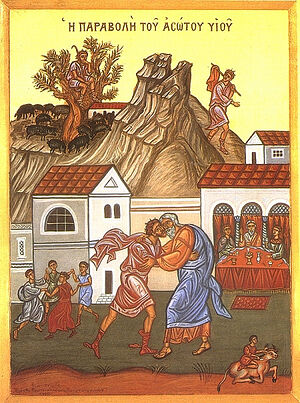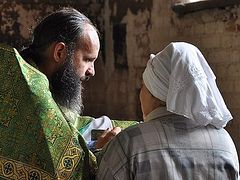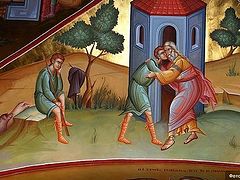 As we continue preparing for our Lenten journey this year, the Church directs our attention to the Parable of the Prodigal Son. This story presents profound truths both about God and about us as His beloved children who have become so enslaved to corrupt desires that we make ourselves and others miserable, becoming at times virtually unrecognizable as those who bear the divine image and likeness. Fortunately, the parable reminds us that we can wake up from our delusions and return to our Father Who wants nothing more than for His sons and daughters to accept their true relationship with Him.
As we continue preparing for our Lenten journey this year, the Church directs our attention to the Parable of the Prodigal Son. This story presents profound truths both about God and about us as His beloved children who have become so enslaved to corrupt desires that we make ourselves and others miserable, becoming at times virtually unrecognizable as those who bear the divine image and likeness. Fortunately, the parable reminds us that we can wake up from our delusions and return to our Father Who wants nothing more than for His sons and daughters to accept their true relationship with Him.
The younger son rejected his relationship with his father, who he viewed simply as a source of money for funding a decadent way of life. He did not treat his father as a beloved person, but simply as someone he wished had already died so that he could take the money and run. That was the worst insult that he could possibly have given the old man. The prodigal son abandoned his family and community so that he could live as an isolated individual who was free to indulge his passions however he saw fit. Once he burned through the cash, however, he endured the consequences of being a stranger in a strange land during a famine. He had no one to help him and sunk so low that he envied the food of the pigs he tended.
In the midst of his misery, the young man finally came to himself and realized that he would be better off as a servant in his father’s house, where there was bread to spare, than in a pig pen starving to death. He recognized how he had broken his relationship with his father and no longer had a claim to be his son; he hoped merely to become one of the hired servants. The young man’s spiritual vision had clarified to the point that he understood the gravity of what he had done. Then he began the long journey home.
In ways that were shocking beyond belief in that culture, the father ran out to hug and kiss the son who had so shamefully repudiated him. The old man did not even consider receiving him as a servant, but said, “‘Bring quickly the best robe, and put it on him; and put a ring on his hand, and shoes on his feet; and bring the fatted calf and kill it, and let us eat and make merry; for this my son was dead, and is alive again; he was lost, and is found.’” The party began, but the older son was offended by the injustice of the celebration, as he claimed to have always obeyed his father and was never given such a party. This fellow missed the point of the father’s joy, for “It was fitting to make merry and be glad, for this your brother was dead, and is alive; he was lost, and is found.’”
As we prepare for Lent, we must remember that our life in Christ is never about getting what we deserve, but concerns entering by grace into the joy of the Savior’s victory over sin and death through His glorious resurrection. Before God, none of us may claim never to have sinned. We are all the prodigal son, for like him we have chosen to live as isolated individuals seeking fulfillment in our self-centered desires for pleasure. It does not matter what forms of pleasure we have put before God, for if we put love for anything before Him we become slaves to our passions in ways that inevitably hinder us from embracing the joy that is ours as “partakers of the divine nature.” The pleasures that the prodigal son sought were base and brought him into obvious misery. It does not take much spiritual insight to see that gravely insulting his father and wasting his inheritance on prostitutes was deplorable. Subtler, however, are our addictions to being right, receiving the approval of others, getting our own way, and making ourselves the judges of other people’s hearts. If we have the attitude of the older brother toward our neighbors, then we are simply showing our self-centeredness by being so concerned about our virtues being recognized that we become blind to the restoration of a child of God.
The father restored the prodigal son by clothing him in a fine robe, shoes, and a ring. The young man had probably been half-naked in filthy rags during his journey home, which reminds us of Adam and Eve who had stripped themselves naked of the divine glory when they put gratifying their own desires before obedience to God. In baptism, we receive the robe of light they rejected as we put on Christ like a garment. Unfortunately, we do not live each day as those who have been restored as the beloved children of God. We participate in the banquet of the Eucharist, nourished by the Body and Blood of the Lamb of God Who takes away the sin of the world. Tragically, we do not live each day as those who are in communion with Christ as members of His own Body, the Church. Like the prodigal son, we so easily fall prey to the temptation to act as isolated and anonymous individuals by gratifying whatever desires have taken our hearts captive. We obscure the distinctive beauty of our souls when we become little more than isolated bundles of inflamed passions.
As we prepare to follow our Lord to His Cross and empty tomb, we have the opportunity to come to ourselves and return to right relationship with our Heavenly Father. We must not refuse to do so out of fear that He will reject us. Like the father in the parable, God is not a vengeful tyrant or a strict dispenser of justice. “God is love” (1 Jn. 4:8) and constantly reaches out to us, calling us to accept restoration as His sons and daughters. All He asks is that we repent by reorienting our lives toward fulfillment in His Kingdom. “A contrite and humble heart, O God, Thou wilt not despise.” Truly humble repentance is never merely a matter of how we feel, but of offering ourselves as whole persons—body, soul, and spirit—to share more fully in the life of Christ.
In today’s epistle reading, Saint Paul addressed a grave problem among the Gentile Christians of Corinth. Some of them followed the sensibilities of pagan culture in thinking that how they lived in their bodies with reference to sex was spiritually irrelevant. He reminded them that the body is holy in light of Christ’s resurrection. They are members of His Body and living temples of the Holy Spirit, and must live accordingly. Whether in Corinth or today, the intimate union of husband and wife as “one flesh” is the only form of sexual relationship and marital union blessed by the Lord as a sign of His Kingdom and of the relationship between Christ and the Church. This is not a matter of engaging in culture wars, but of recognizing the truth about how to find healing for our souls as we struggle to live faithfully as the men and women God created us to be. Even as the father restored the prodigal son after wasting his inheritance on prostitutes, God’s healing mercy extends to sexual sins of whatever form and enables a purity of heart that permeates every dimension of our lives as we gain the spiritual strength to live in accordance with His gracious purposes for our salvation. We must not let shame, which is simply hurt pride, about sexual or any other type of sin keep us from taking the journey back to our Father.
Let us use the spiritual disciplines of Lent to come to ourselves as we gain a clearer recognition of the ways in which we have refused to live as the beloved sons and daughters of our Lord. If we humbly reorient our lives toward Him and away from slavery to our passions, we will find restoration, blessing, and joy. We must use the coming season to leave behind the filth and misery of the pig pen and to enter by grace into the joy of a heavenly banquet that we definitely do not deserve.



